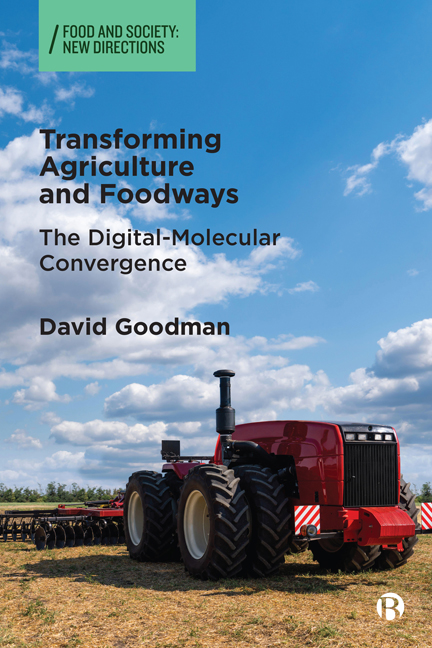Book contents
- Frontmatter
- Dedication
- Contents
- Series Preface
- List of Abbreviations
- Acknowledgements
- 1 Introduction: Technological Convergence and Change in Modern Agro-Food Systems
- 2 Precision Agriculture: Big Data Analytics, Farm Support Platforms, and Concentration in the AgTech Space
- 3 Precision Agriculture: Adoption, ‘Re-Scripting’, Farmer Identity, Path Dependence, and ‘Appropriationism 4.0’
- 4 Alternative Proteins: Bio-Mimicry, Structuring the New Protein Industry, ‘Promissory Narratives’, and ‘Substitutionism 4.0’
- 5 Agri-Biotechnology and the Failed Promises of the Seed-Chemical Complex, CRISPR and Gene Editing, and Regulatory Capture
- 6 Between Physical Space and Digital Space: COVID-19, Platform Capitalism, and Changing Patterns of Food Provisioning
- 7 Conclusion: Continuities in Change and Lost Opportunities
- Postscript
- Notes
- References
- Index
2 - Precision Agriculture: Big Data Analytics, Farm Support Platforms, and Concentration in the AgTech Space
Published online by Cambridge University Press: 18 January 2024
- Frontmatter
- Dedication
- Contents
- Series Preface
- List of Abbreviations
- Acknowledgements
- 1 Introduction: Technological Convergence and Change in Modern Agro-Food Systems
- 2 Precision Agriculture: Big Data Analytics, Farm Support Platforms, and Concentration in the AgTech Space
- 3 Precision Agriculture: Adoption, ‘Re-Scripting’, Farmer Identity, Path Dependence, and ‘Appropriationism 4.0’
- 4 Alternative Proteins: Bio-Mimicry, Structuring the New Protein Industry, ‘Promissory Narratives’, and ‘Substitutionism 4.0’
- 5 Agri-Biotechnology and the Failed Promises of the Seed-Chemical Complex, CRISPR and Gene Editing, and Regulatory Capture
- 6 Between Physical Space and Digital Space: COVID-19, Platform Capitalism, and Changing Patterns of Food Provisioning
- 7 Conclusion: Continuities in Change and Lost Opportunities
- Postscript
- Notes
- References
- Index
Summary
Introduction
In the online reporting and boosting of technological innovation in agriculture, the ‘AgTech space’ is a broad, amorphous category, but its central frame of reference is the digitalisation of agricultural commodity production. Leading dramatis personae include Silicon Valley venture capitalists financing innovation ‘accelerator funds’ and ‘incubators’ that are propelling the explosive growth of start-ups, mainly software firms – Day (2019) has mapped over 1,600 start-up companies in this sector in the past 5 years. This innovation space also is populated by Big Ag and Big Tech mega-platforms1 pursuing M&A strategies and joint ventures, discussed later. In this and the following chapter, we examine the varied dimensions and implications of the digitalisation of major field crop production in the US and Western Europe. Cumulatively, these analyses support our central argument that current techno-scientific innovation is path dependent and reinforces the incumbent paradigm of industrial agriculture, as Wolf and Buttel (1996) concluded much earlier. Moreover, the diffusion of PA technologies and the accompanying emergence of corporate farm support platforms have provoked new rounds of industrial consolidation, accentuating already high levels of concentration in the ‘seed-chemical complex’ (Howard, 2016, 2021; MacDonald, 2019). These points, together with a brief digression on platforms as an organisational form and business strategy, are developed more comprehensively in the following sections.
The key digital innovations of PA are GPS-assisted systems for yield monitoring and soil mapping, auto-steer farm machinery guidance systems, a variety of sensors, and surveillance devices, such as drones, that combine to support site-specific, variable rate input application technologies. In practice, these technologies are being adopted and disseminated, whether singly or in combination, at different speeds, depending on farm size and farmer risk preference. Access to such so-called decision support tools is controlled by the proprietary farm management platforms of competing agribusiness corporations, including Bayer-Monsanto, the Syngenta Group, and John Deere. The adoption and diffusion process and contested issues of farmer identity, privacy, data ownership, and technological path dependence are taken up in Chapter 3.
- Type
- Chapter
- Information
- Transforming Agriculture and FoodwaysThe Digital-Molecular Convergence, pp. 12 - 20Publisher: Bristol University PressPrint publication year: 2023

